|
|
|
Sort Order |
|
|
|
Items / Page
|
|
|
|
|
|
|
| Srl | Item |
| 1 |
ID:
183716
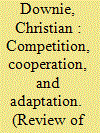

|
|
|
|
|
| Summary/Abstract |
In policy domains characterised by complexity, international organizations (IOs) with overlapping mandates and governance functions regularly interact in ways that have important implications for global governance. Yet the dynamics of IO interactions remain understudied. This article breaks new ground by building on the theoretical insights of organizational ecology to examine IO competition, cooperation, and adaptation in the domain of energy. Drawing on original empirical data, I consider three related hypotheses: (1) competition between IOs in the same population is likely to centre on material resources; (2) IOs are more likely to cooperate when they have a shared governance goal; and (3) individual IOs can adapt by changing their goals and boundaries. In considering these hypotheses, this article highlights the limits of the organizational ecology approach and the need to broaden it to account for the possibility that IOs do cooperate, and that individual IOs, such as the International Energy Agency, have the capacity to adapt to changes in their environment.
|
|
|
|
|
|
|
|
|
|
|
|
|
|
|
|
| 2 |
ID:
183709
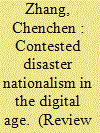

|
|
|
|
|
| Summary/Abstract |
This article examines how affective narratives of the COVID-19 pandemic on Chinese social media reinforce and challenge established scripts of national identity, political legitimacy, and international geopolitical imaginary. Taking theoretical insights from the scholarship on trauma, disaster nationalism, and politics of emotions, I structure the analysis of social media posts from state media and private accounts around three emotional registers: grief as a crucial site of control and contestation during the initial stage of the outbreak; gandong (being moved in a positive way) associated with stories of heroic sacrifices, national unity, and mundane ‘heart-warming’ moments; and enmity in narratives of power struggles and ideological competition between China and ‘the West’, especially the United States. While state media has sought to transform the crisis into resources for strengthening national belonging and regime legitimacy through a digital reworking of the long-standing repertoire of disaster nationalism, alternative articulations of grief, rage, and vernacular memory that refuse to be incorporated into the ‘correct collective memory’ of a nationalised tragedy have persisted in digital space. Furthermore, the article explicates the ways in which popular narratives affectively reinscribe dominant ideas about the (inter)national community: such as the historical imagination of a continuous nationhood rising from disasters and humiliation, positive energy, and a dichotomous view of the international order characterised by Western hegemony and Chinese victimhood. The geopolitical narratives of the pandemic build on and exacerbate binary oppositions between China and ‘the West’ in the global imaginary, which are co-constructed through discursive practices on both sides in mutually reinforcing ways. The lens of emotion allows us to attend to the resonances and dissonances between official and popular narrativisations of the disaster without assuming a one-way determinate relationship between the two.
|
|
|
|
|
|
|
|
|
|
|
|
|
|
|
|
| 3 |
ID:
183715
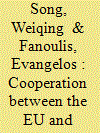

|
|
|
|
|
| Summary/Abstract |
The European Union's partnership with China has received significant academic attention. Experts have focused on both parties’ economic and political objectives and have made efforts to grasp the dynamics of the institutionalisation of EU-China cooperation. However, little has been said about how this collaboration affects the lives of citizens, especially in China. Adopting a Foucauldian epistemology, this article's key contention is that EU-China cooperation imposes a joint form of post-liberal governmental power on the Chinese population, which socially constructs empowered but not liberal political subjectivities for Chinese citizens. The article first reviews Foucault's approach to governmentality. It then explores Sino-EUropean collaboration after 2013, when the two partners established the ‘EU-China 2020 Strategic Agenda for Cooperation’. We illustrate how the institutionalisation of the partnership has been consistent with a governmentalised political rationality, and how policy implementation has allowed a post-liberal form of governmental power to flow from both EU and Chinese policymakers towards the Chinese population, triggering processes of political subjectivisation.
|
|
|
|
|
|
|
|
|
|
|
|
|
|
|
|
| 4 |
ID:
183711
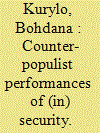

|
|
|
|
|
| Summary/Abstract |
IR scholarship has recently seen a burgeoning interest in the right-wing populist politics of security, showing that it tends to align with the international ultraconservative mobilisation against ‘gender ideology’. In contrast, this article investigates how local feminist actors can resist right-wing populist constructions of (in)security by introducing counter-populist discourses and aesthetics of security. I analyse the case of Poland, which presents two competing populist performances of (in)security: the Independence March organised by right-wing groups on Poland's Independence Day and the Women's Strike protests against the near-total ban on abortion. The article draws on Judith Butler's theory of the performative politics of public assembly, which elucidates how the political subject of ‘the people’ can emerge as bodies come together to make security demands through both verbal and non-verbal acts. I argue that the feminist movement used the vehicle of populist performance to subvert the exclusionary constructions of (in)security by right-wing populists. In the process, it introduced a different conception of security in the struggle for a ‘livable life’. The study expands the understanding of the relationship between populism, security and feminism in IR by exploring how the populist politics of security is differently enacted by everyday agents in local contexts.
|
|
|
|
|
|
|
|
|
|
|
|
|
|
|
|
| 5 |
ID:
183714
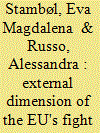

|
|
|
|
|
| Summary/Abstract |
The article constitutes the first comprehensive review of the EU's export of crime control policies and ‘aid to internal security’ across regions over the last 15 years. Drawing on both International Relations and criminology, it develops an analytical framework to identify the political rationalities and technologies of crime control that the EU attempts to transfer across the Eastern and Southern (extended) neighbourhoods. By scrutinising 216 projects aimed at combating transnational crime beyond Europe's borders, spanning law enforcement, border security, criminal justice, and the penitentiary sector, the empirical analysis is geared towards detecting and systematising the ways of thinking and doing crime control that the EU seeks to promote and export. Moreover, it investigates the ‘action at a distance’ whereby it does so. It is argued that in shaping third countries’ ability to criminalise, police, indict, convict, and punish, the EU is simultaneously defining its own security actorness, specifically consolidating its role as a ‘global crime fighter’.
|
|
|
|
|
|
|
|
|
|
|
|
|
|
|
|
| 6 |
ID:
183713
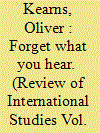

|
|
|
|
|
| Summary/Abstract |
As the covert and clandestine practices of states multiplied in the twentieth century, so did these practices’ footprint in public life. This footprint is not just visual and material but sonic and aural, sounding the ‘secret state’ into being and suggesting ways of ‘listening in’ on it. Using multisensory methodology, this article examines Careless Talk Costs Lives, a UK Second World War propaganda campaign instructing citizens on how to practice discreet speech and listening in defence against ‘fifth columnist’ spies. This campaign reproduced the British secret state in the everyday: it represented sensitive operations as weaving in and out of citizens’ lives through imprudent chatter about ‘hush-hush’ activities and sounds you shouldn't overhear. The paradox at the campaign's heart – of revealing to people the kind of things they shouldn't say or listen to – made the secret state and its international operations a public phenomenon. Secret sounds therefore became entangled within productions of social difference, from class inequalities to German racialisation. Sound and listening, however, are unwieldy phenomena. This sonic life of the secret state risked undermining political legitimacy, while turning public space and idyllic environments into deceptive soundscapes – for international espionage, it seemed, sounded like ordinary life.
|
|
|
|
|
|
|
|
|
|
|
|
|
|
|
|
| 7 |
ID:
183712
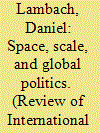

|
|
|
|
|
| Summary/Abstract |
Space matters for global politics but the treatment thereof in International Relations (IR) has been uneven. There is broad interest in spatial aspects across many research communities but only a nascent theoretical discussion and little cross-field communication. This article argues for a fuller engagement of IR scholars with sociospatial concepts and proposes a spatial approach to global politics based on four essential dimensions: a spatial ontology, the constructedness of space, a scalar perspective, and the interaction of materiality and ideas. As one possible way of integrating these aspects into a more specific concept, the article elaborates a framework of spatial practices and uses the example of Arctic Security research to illustrate the upsides of such a spatial approach for IR research.
|
|
|
|
|
|
|
|
|
|
|
|
|
|
|
|
| 8 |
ID:
183717
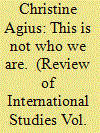

|
|
|
|
|
| Summary/Abstract |
The Trump presidency ushered in a heightened sense of ontological insecurity in the US, based on a national self-narrative that portrayed an emasculated America. Trump promised to return the US to primacy by pursuing policies and practices that focused on border protection, militarisation, and the vilification of external others, while amplifying racial tensions within the country. From caging immigrant children at the border, to an enabling of white supremacy and the Capitol riots, Trump's presidency was broadly seen as aberration in the self-narrative of America as a tolerant, democratic nation. In this article, I am interested in how gendered bordering practices inform ontological (in)security in Trump's narrative of the nation, domestic and external policy, and discourses. While Trump's electoral loss to Biden in 2020 has been described as a ‘return to normal’, this article instead considers how Trump's presidency exhibited lines of continuity when examined through a gender lens. Understanding how masculinism informs ideas of ontological security reveals how notions of gendered bordering, hierarchy, and ordering have been persistent threads in US politics, rather than simply an anomaly under Trump. This suggests greater potential to read ontological security in more complex terms through gendered bordering practices.
|
|
|
|
|
|
|
|
|
|
|
|
|
|
|
|
| 9 |
ID:
183710


|
|
|
|
|
| Summary/Abstract |
On 26 March 2020, the leaders of the Group of twenty major economies (G20) convened in an emergency virtual meeting to discuss the extraordinary situation facing the world. Virtual summitry provided a stark visual contrast to the traditional staging of modern multilateral diplomacy – leaders were suddenly responsible for their own staging, leaving them with new opportunities to create a favourable impression of how they, and their respective state, would be seen. Taking the disruption of virtual summitry as a starting point, we focus on the resulting new opportunities for visual diplomacy. We draw on the symbolic interactionism of Erving Goffman and we argue that status signalling in this context was based on a shared understanding of the symbols and resources that have social value in the interaction order of summit diplomacy. Based on a visual analysis of 51 photographs from the G20 video conference, we find that the visual performances during the extraordinary meeting reflected evident, but not necessarily intentional, attempts at status seeking. The article thus contributes to an increased understanding of how visual performances contribute to uphold status distinctions in multilateral diplomacy.
|
|
|
|
|
|
|
|
|
|
|
|
|
|
|
|
|
|
|
|
|